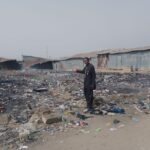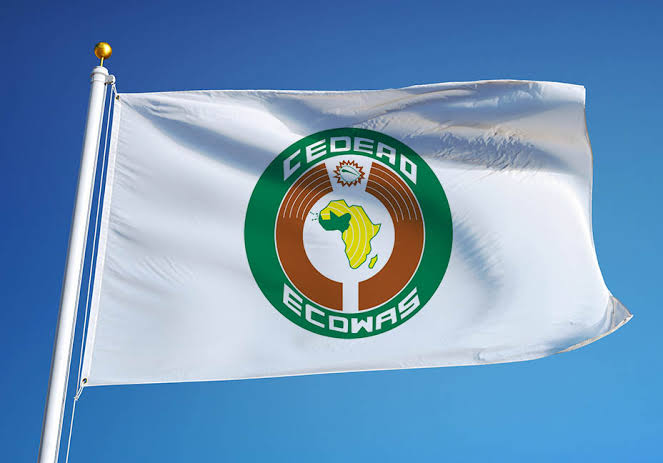By Linus Aleke
To say that all is well with West African sub region is to live in self denial, hence the unavoidable question, is ECOWAS region, a home of hunger or a killing field?
Those whose answer are in the affirmative on both fronts may be right, while those whose answer are in the negative may also not be wrong depending on which divide they fall. Those on the government side may certainly not agree with the above, while those at the receiving end may not blink an eye lid before affirming both to be incontrovertible truth. The story of seven blind men and the elephant, easily comes to mind here. Elephant is like a tree, no, it is like a fan, etc. The description were dependent on the part of the body the blind men encountered. It may also be a matter of perception, and as we know, certain factors are directly or indirectly responsible for individual perception of issues.
However, like the Jewish elders would ask, can anything good come of Nazareth, the answer, of course is in the affirmative, because Jesus Christ, whom the Christian adherents refer to as the saviour of the world, emanated from Nazareth.
West African sub region is not an exception, like Nazareth, several good things have sprang up from the region. Therefore, to attribute only negatives to West Africa, is akin to attributing child bearing to men instead of women.
The only problem here is that minority in the region live in splendor, while, majority of the community members live in squalor and penury. Local and international statistics bears eloquent testimony to the above postulations.
For instance, Nigeria, the most populous black country in the world, and the largest democracy in Africa, is domiciled in West Africa.
Meanwhile, before March 2022, the country was the capital of people living in extreme poverty in the world, an inglorious position handed over to her by India.
Interestingly, latest report shows that India has again surpassed Nigeria as the nation with the highest number of extremely poor people.
The World Poverty Clock (WPC) said this in its 2022 update, considering the COVID-19 pandemic economic effect.
The World Poverty Clock is an online tool that monitors the progress against poverty globally and regionally and provides real time poverty data across countries. According to its data, extremely poor people are those living on less than $2 per day.
In 2018, Nigeria held the position with about 87 million people in extreme poverty, compared with India’s 73 million. But the current data shows that 83 million Indians have been plunged into extreme poverty in 2022, representing six percent of the country’s population which stands at 1.3 billion.
For Nigeria, the World Poverty Clock said, 70 million people are living in extreme poverty, representing 33 percent of Nigeria’s over 200 million people.
This embarrassing statistics on the level of extreme poor people is not a Nigerian or Indian thing alone as other West African countries are also deeply affected.
It is important at this point to note that there is a nexus between extreme poverty and hunger. A poor person is a darling of hunger any time any day, because of his lack of means to buy food sustainably.
The current population of Western Africa according to United Nations estimates, stands at 431,200,063 as of Friday, May 12, 2023.
The UN data further revealed that Western Africa population is equivalent to 5.16% of the total world population.
Also, Western Africa ranks number two in Africa, among subregions ranked by population.
Regrettably, West African region today can best be described as home for hunger and killing field, not for animals but humans.
The Sahel region, which is largely situated in West Africa, is the de facto headquarters of terrorist groups. And where ever terrorists are found in large number, the environment automatically metamorphosis into killing field.
In modern society, government build abattoir, where animals are taken to slaughter for hygienic purposes, so that those who will consume the meat at the end of the day will not have to contend with any diseases arising from filthiness and unhygienic practices.
But in the case of the terrorists, the field where they found themselves is the slaughter, they bother less about hygiene, because they are not killing to eat but to distabilize authorities, or send messages to regional, national or municipal principalities, by mean of savage.
The case in point was the slaughtering of 43 farmers by Boko Haram terrorists on 29, Nov, 2020, at a rice plantation, located at Zabarmari village, in Jere Local Government of Borno State, Northeast Nigeria.
But, lamenting, the spike in hunger and food insecurity in West Africa, the President of ECOWAS Commission, Dr. Omar Alieu Touray, said, the ECOWAS region is facing the persistence of factors that aggravate
food and nutrition crises.
Dr. Touray noted that
these include civil insecurity, which has resulted in more than 7.5
million internally displaced persons being deprived of their means of existence (housing,
productive capital, social network) and access to education and health, stressing that this ugly situation is now extended to the north of Togo and Benin.
Others, he said, include, persistent inflation, which limits households’ ability to access
sufficient nutritious food and the worsening of the harmful effects of climate change, which is
making food systems more fragile.
The President who said this while, presenting the state of implemention of the Community work- programmes, at the ongoing 2023 First Ordinary Session of ECOWAS Parliament in Abuja, noted that as of 30 March 2023, despite good production, about 29.5 million people needed emergency food and nutritional assistance.
Dr. Touray, said, if appropriate measures are not taken, this figure could rise to 42.5 million people during the lean season between
June and August 2023.
In addition, he said, 107.5 million people are estimated to be food insecure, and could fall
into crisis in the event of shocks, notably in Nigeria (64 million), Niger (7.3 million) and Burkina
Faso (5.1 million).
The president noted that the nutrition crisis also persists in Burkina Faso, Mali, Mauritania, Niger, and Chad, where nearly 16.5 million children under the age of five suffer from acute malnutrition.
On the effort already made to address the issue of hunger and food insecurity in the region, the president said, “ECOWAS, together with all its regional partners (CILSS, UEMOA) and international partners
have provided responses to food and nutrition insecurity during 2022 and during the first
quarter of 2023 specifically in seven countries (Burkina Faso, Cabo Verde, Mali, Niger, Nigeria, Senegal, and Chad). In addition to the use of stocks from the Regional Food Security Reserve, nearly US$1.1 million, or 66% of the total projected budget of US$1.64 billion of the response plans that were prepared by the Member States in July 2022, has been mobilized”.
He however, lamented that, “the increasing trend of needs continues as well as the scarcity of resources to finance these response plans; this situation reminds us once again of the urgency of changing the paradigm in the management of food and nutrition issues by all actors by implementing an intervention approach based on the humanitarian peace development nexus in the fragile zone”.
Alas, the figures presented by the Commission is at variance with what is contained in the country report of member states.
This, observers said, is not unconnected with suppression of facts by politicians to present their respective government in good light before the public.
For instance, the Nigerian Delegation to the Community Parliament of the Economic Community of West African States (ECOWAS), said, that no fewer than 25 million Nigerians are at risk of starvation in second and third quarter of 2023.
This negative and frightening hunger statistics, is contained in the Nigerian Country Report, presented at the ongoing 2023 First Ordinary Session of ECOWAS Parliament, in Abuja.
Quoting United Nations (UN), statistics, Hon. Lynda Chuba Ikpeazu, who presented the report on behalf of 33 members of the delegation, noted, that in March 2023, the Food and Agricultural Organization (FAO), in its quarterly report
projected that nearly 25 million Nigerians are at risk of facing hunger between June and August of 2023.
The Nigerian Country Report to ECOWAS Parliament, added that out of the 17 million people who are currently food insecure, three million are in the north-east states of Borno, Adamawa and Yobe.
Hon. Ikpeazu, also, observed that with this adverse report, the level of hunger in Nigeria is bleak.
The figure of 25 million contained in the Nigeria’s country report is a far cry from the Commission’s figure of 64 million.
On the issue of terrorism, the Speaker of ECOWAS Parliament, Rt. Hon. Sidie Mohamed Tunis, expressed worries over proliferation of terrorist activities in the Sahel, which has resulted into the killings of innocent lives.
Dr. Tunis who spoke at the opening of the 2023 First Ordinary Session in Abuja, noted that it is
expected that the President of the ECOWAS Commission, during the
presentation of his report, would kindly provide detailed explanations on
these issues to inform Parliament’s position.
Nevertheless, the President of the Commission, noted that ECOWAS is seriously concerned about the security situation prevailing in region, with the persistence and
resurgence of terrorist acts in the countries of the three- border line: Burkina Faso, Mali, Niger, and northeastern
Nigeria.
These acts, Dr Touray, said, have resulted in targeted attacks against both military personnel and civilians, resulting in numerous casualties, material damage and displacement.
The President said, the novelty of these attacks is that they are spreading to coastal countries (Benin, Togo, and Côte d’Ivoire).
Noting that today’s meeting is taking place in a context characterized by upheavals in the
international environment, Dr Touray, said, the situation in ECOWAS region remains worrisome.
He nonetheless, said, the institution is deploying all resources to ensure stability, security, and resilience in Member States.
On the regional action against terrorism, Dr. Touray said, ECOWAS has been advised by experts from the national
security agencies to prioritize the deployment of assistance to existing regional arrangements
such as the Accra Initiative, the G5 Sahel, and the Multinational Joint Task Force, all within the framework of the ECOWAS Action Plan.
He disclosed that the concept of Operations for the deployment of
ECOWAS Standby Force to fight against terrorism and unconstitutional changes of government
has two options.
He noted that option one provides for a Brigade of 5,000 personnel with its structure, composition, and the necessary logistics to conduct kinetic operations, and its estimated
annual cost is USD2,253,862,306.00.
Option two, the President said, consists of the deployment of critical
capabilities in support of affected Member States upon request with an estimated annual cost
of USD352,833,334.00.
The overall estimated cost, Dr. Touray, said is
USD2,606,695,640, noting that this shows the cost
involved in security and reminds us of the need to invest in conflict prevention.
In this regard, he said, ECOWAS institutions have continued with their efforts to tackle the proliferation of small arms and light weapons.
“Working with the national commissions on small arms, some trainings were conducted
between January and March 2023. About eighty personnel from the security services who
are focal persons of the Exemption Procedure in their respective ministries and agencies
acquired requisite knowledge on arms transfer management as well as competencies and skills for enhanced management of the ECOWAS Exemption Procedure,” Dr. Touray concluded.
It was Jesus of Nazareth who told the Samaritan woman at the well side that a time shall come and that time is now when the true worshiper shall worship God in truth and spirit. In same vain therefore, a time shall come and that time is now, when ECOWAS authorities shall begin to talk less and work more to move the region out of the woods where her citizens will no longer be at the mercy of terrorists and hunger.












